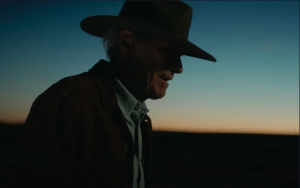CRY MACHO: 2 ½ STARS. “memories colour every frame of the new film.”
 Clint Eastwood is a legendary in Hollywood for his no nonsense approach to filmmaking. He’s not Stanley Kubrick who would do 200 takes of a head turn, or Christopher Nolan whose camera technique is sharp as a tack. His unfussy approach to storytelling often gives his films a unique energy all their own, a style born out of confidence and almost 70 years I’m standing in front of or behind a camera.
Clint Eastwood is a legendary in Hollywood for his no nonsense approach to filmmaking. He’s not Stanley Kubrick who would do 200 takes of a head turn, or Christopher Nolan whose camera technique is sharp as a tack. His unfussy approach to storytelling often gives his films a unique energy all their own, a style born out of confidence and almost 70 years I’m standing in front of or behind a camera.
Depending on your level of cynicism, “Cry Macho,” his new road trip movie now playing in theatres, is either the work of a filmmaker so confident in his craft he trusts the audience will follow him wherever he goes, no matter how meandering, or a slender, slapdash exercise in myth building.
Set in 1979, the story begins when wealthy Texas ranch boss (Dwight Yoakam) calls in a favor from former employee Mike Milo (Eastwood). He wants the former rodeo star and ranch hand to travel to Mexico, find his estranged thirteen-year-old son Rafo (Eduardo Minett) and bring him back to the States. The boy’s mother (Fernanda Urrejola) is an aristocratic woman with a short temper who seems to care nothing about her son. “Take him if you can find him,” she hisses. “He’s a monster.”
Mike tracks down Rafo at a cockfight, where he is about to put Macho, his prizewinning rooster, into the ring. “He is not a chicken,” Rafo says, “he’s Macho.” The boy agrees to head to the States with Mike, excited at the prospect of becoming a real cowboy on his father’s ranch.
Along the way the surrogate father and son duo hide out from the Federales, meet a kind-hearted cantina owner (Natalia Traven) and learn the true meaning of what it means to be macho.
Based on a neo-Western book by N. Richard Nash that Eastwood has been circling around for decades, “Cry Macho” isn’t story driven as much as it latches onto the framework of the road trip genre to find momentum. It’s a low energy film that is more character study of a man forced to reassess the way he has lived his life. “This macho thing is overrated,” he says.
The movie’s meta aspect is its strongest feature. Eastwood has spent his career as a personification of machismo, and now, at a frail looking 91 years-old, he is making a comment not only on his character Mike, but of all the characters he has played before. It’s hard to watch “Cry Macho” without picturing “The Outlaw Josey Wales” or “The Unforgiven,” and those memories color every frame of the new film.
Unfortunately, those reminders may also make you nostalgic for the days of “The Outlaw Josey Wales” and “The Unforgiven.” “Cry Macho” has compelling ideas at its core, but is marred by Minett’s emotive performance, direction that feels directionless and the most laughably inept henchman in the history of film. Eastwood is stately, a lion in winter, but the film feels unambitious, lacking in the drama that would have made its messages on masculinity more potent.
